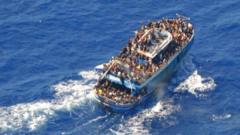Leaked audio from the Greek rescue coordination center has ignited controversy over the tragic sinking of a migrant boat in June, contradicting Greece's claim that the migrants did not wish to be rescued. Survivors allege misconduct by the coastguard, exacerbating calls for an international inquiry.
Leaked Audio Raises Questions on Greek Coast Guard's Role in Migrant Disaster

Leaked Audio Raises Questions on Greek Coast Guard's Role in Migrant Disaster
New recordings reveal troubling instructions from Greek rescue coordinators, challenging the official narrative surrounding the tragic shipwreck that claimed up to 650 lives.
Leaked audio instructions by Greek rescue coordinators have raised significant doubts regarding Greece's official account of the June sinking of a migrant boat that resulted in the loss of up to 650 lives. The vessel, the Adriana, sank in international waters on June 14, 2023, shortly after departing from Libya. Survivors later recounted to the BBC that Greek coastguards had caused the overcrowded fishing boat to capsize during an aborted towing attempt, and some were allegedly coerced into silence about the event. The Greek coastguard maintains its stance, asserting that they did not intervene as the boat was not in distress and that the migrants voluntarily sought to reach Italy instead of Greece.
Emerging phone calls reveal alarming directives from an unnamed man within a Greek rescue coordination center, instructing the boat's captain to inform an approaching vessel that the migrants did not want to go to Greece. Despite not commenting on these recordings, the coastguard indicated that all relevant evidence has been handed over to a Naval Court conducting investigations into the catastrophe.
This incident ranks among the most severe maritime disasters in recent Mediterranean history, with estimates suggesting the boat was carrying as many as 750 migrants, originating from the Libyan port of Tobruk. So far, only 82 bodies have been recovered, with the United Nations estimating that approximately 500 individuals—including women and children—remain unaccounted for.
Audio recordings, obtained by the Greek outlet News247.gr, show interactions between the Joint Rescue Coordination Centre (JRCC) at Piraeus and the captain of an intermediary ship offering supplies to the migrants. In the first recorded call, shortly before the sinking, a coastguard officer advises the captain to convey to an upcoming aid vessel, "We don't want to go to Greece." A follow-up conversation confirms that the migrants expressed a desire to go to Italy instead of Greece.
Despite claims from the coastguard about rescuing more than 250,000 migrants over the last decade and apprehending numerous smugglers, internal investigations into this disaster persist. Skepticism over Greece's narrative is further fueled by evidence indicating the migrant vessel had been stationary for hours before capsizing, countering claims that it was en route to Italy without need for rescue.
A prior ruling by a Greek court absolved nine Egyptians charged with causing the shipwreck, citing jurisdictional limits due to the incident occurring in international waters. Survivors' testimonies challenging the coastguard's account have been dismissed, raising concerns about a cover-up. Human rights advocates, including groups like Amnesty International, have called for an unbiased international investigation into the sinking.
The Greek Ombudsman has been examining the claims, and a comprehensive probe by the Greek Naval Court is also underway.






















